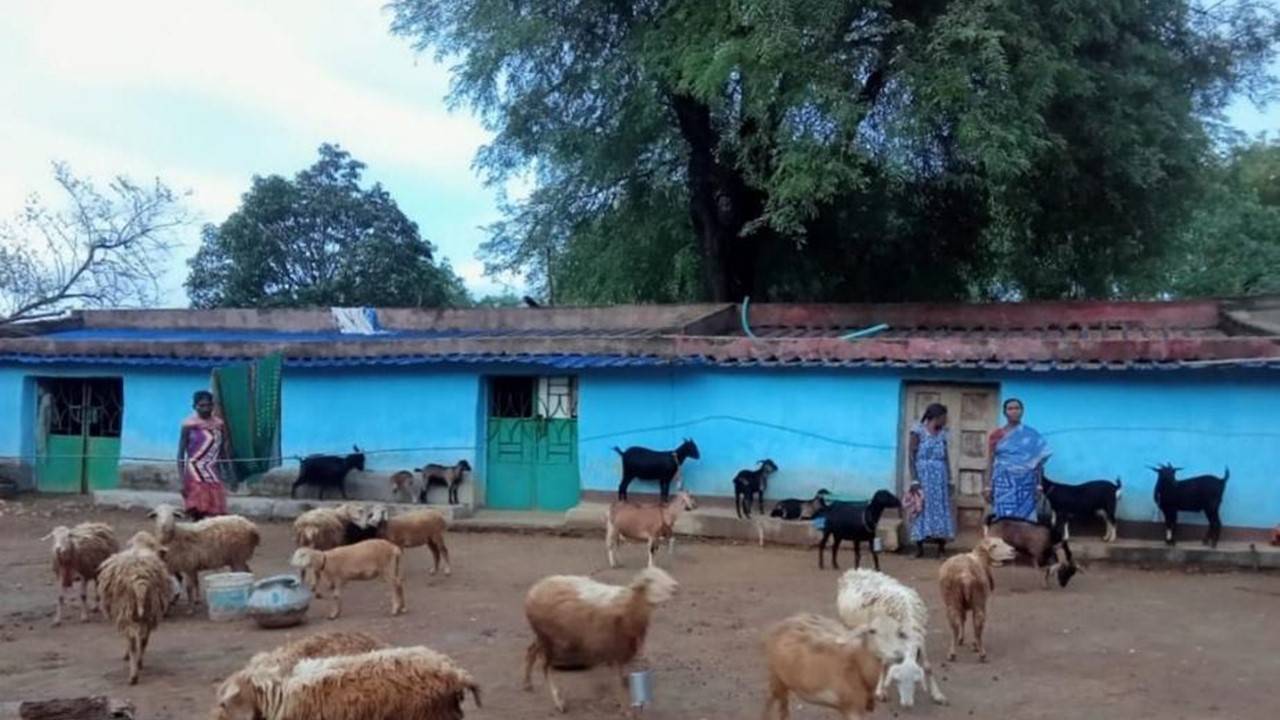Distrust→apprehension→courage→success: Savita Saveiya spreads her wings! by Nishu Nishant, Chakradharpur, Jharkhand
- Home
- Stories From The Ground
- Distrust→apprehension→courage→success: Savita Saveiya spreads her wings! by Nishu Nishant, Chakradharpur, Jharkhand
“Mujhe dawai aur tika me bharosa nhi, ye sab bakri ko kmjor kar degi aur wo mar jayegi” (I don't trust these medicines and vaccination. These will make the goats weak and they will die), said Savita Saveiya when asked the reasons behind not getting her livestock vaccinated.
But Savita Saveiya, just like other tribal members from the Ho community in the area, was also dealing with challenges of high mortality rate of her livestock. Lack of trust in medicines and struggling with the health of livestock had become a part of her life.
Who is Savita Saveiya?
Belonging to Brindawan village in Sonua block of Jharkhand, Savita Saveiya and her spouse, Ghasiram Saveiya are involved in different kinds of activities including rain-fed agriculture which happens once a year. They grow paddy, maize, and few vegetables for daily usage on their land of one acre to feed their family of ten.
Life was tough! No permanent source of income to take care of ten people was challenging. Livestock was the only saving grace.
They have always been an integral part of tribal life. Not only a part of festivals like Sohrai, where they worship and celebrate the animals, livestock also play an important role in income generation and employment. Tribal communities have always looked at livestock as a small ATM machine which supports them in tough situations. And this was the case with Savita Saveiya as well.
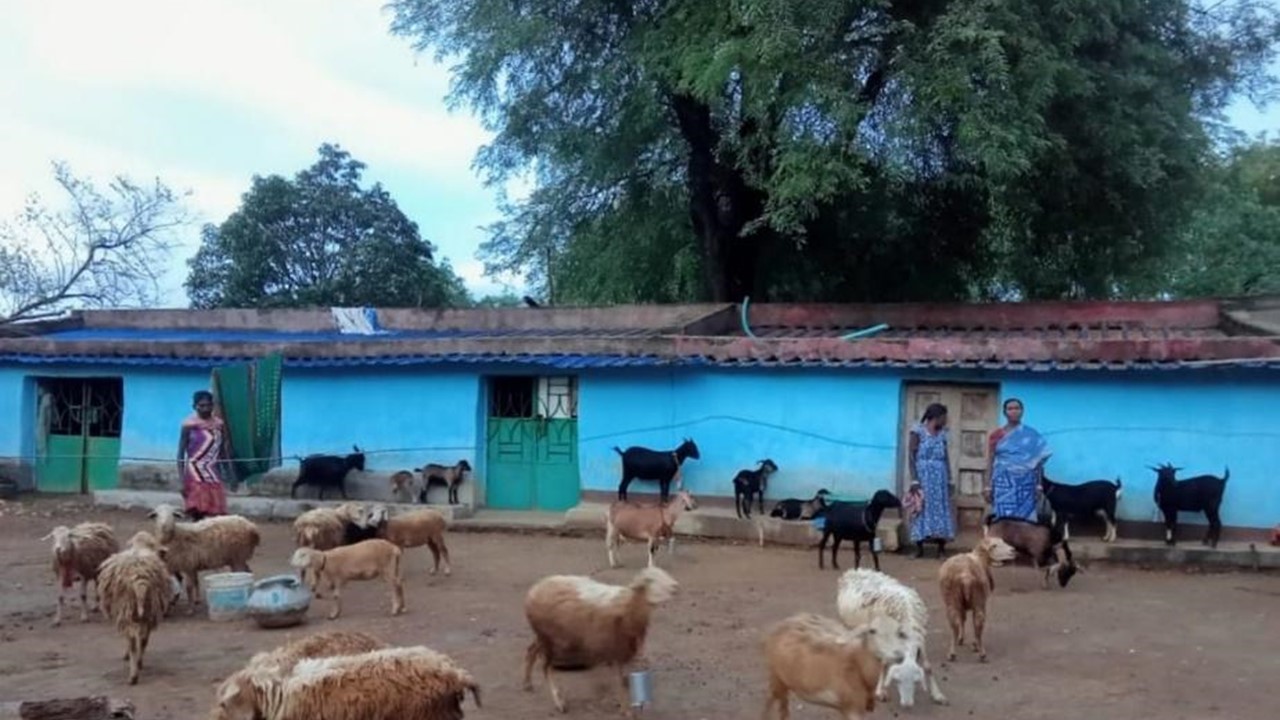 Fig. Livestock in the village of Brindawan
Fig. Livestock in the village of Brindawan
So, what was the problem?
Despite the immense importance of livestock in the lives and livelihoods of tribals, the mortality rate of the animals was a big problem for them. It was also not letting them use livestocks as a permanent source of income and improve their financial status.
Savita Saveiya herself has been working as a livestock farmer for about ten years; but her income was low and inconsistent throughout this time period. The absence of knowledge and proper tools to increase the longevity of the livestock has been a constant problem.
It was not their fault as well!
“Pehle bhi aise hi koi log aaye the, tika lagake chale gae aur ek hafte baad meri 2 bakriyan marr gai” (People have come here earlier as well, they gave vaccination to the goats but they died within a weak), said an apprehensive Savita while talking about her distrust for medicines.
The lack of information, unavailability of proper guidance, and improper implementation of projects can lead to apprehension among anyone.
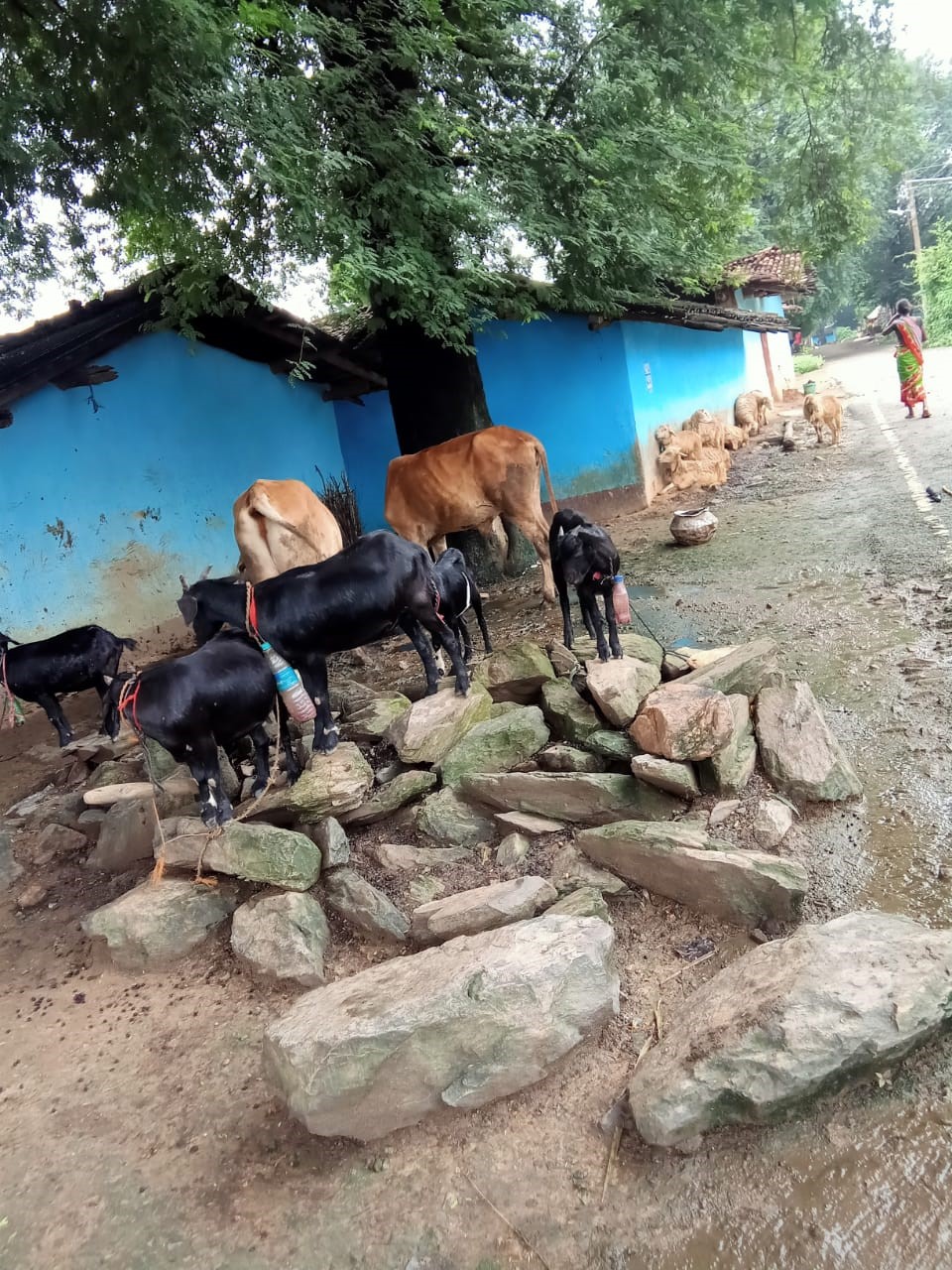 Fig. Livestock in the village of Brindawan
Fig. Livestock in the village of Brindawan
START of a long term solution
The project START (Stimulating Tribal and Rural Transformation) in collaboration with the RBL Bank Ltd. started in 2019 in Sonua block of Jharkhand. The project has helped train many Pashushakhis since then, who visit village to village and vaccinate livestocks against deadly diseases.
PRADAN also reached out to Brindawan village during one such intervention in 2022. With the help of Kaushlya Das, a Pashu Sakhi from Sonua working with PRADAN since 2019, a small camp on livestock was organised. Villagers were informed about the importance of regular care, types of vaccinations, and the benefits of rearing livestock for long term economic solutions.
The villagers were still apprehensive. So was Savita Saveiya.
After a detailed discussion, a few villagers agreed to get their goats vaccinated but Savita Saveiya was still unsure.
She had 10 goats and they were struggling with health. She could earn a meagre Rs. 5,000-10,000 by selling them. She was scared of losing the few livestocks she had to medicine and vaccination.
What changed?
“Kaushlya didi, meri bakriyon ko bhi tika laga do. Bagal wale ki bakriyan ekdum swastha hai aur meri marr gai” (Kaushlya didi, please vaccinate my goats as well. The goats of my neighbours whom you vaccinated a few months ago are healthy while three of mine have died in the meantime) said a surprised Savita.
The livestock trainer vaccinated her animals and also taught Savita Seviya the methods like proper feed, hygiene, importance of clean water, and tidying cattle’s home regularly through training and handholding support for the well-being of her livestock. She also helped her get access to quality feed and medicine.
Eventually, all of Savita’s goats got vaccinated. She was hopeful of the wellbeing of her livestock. PRADAN under the project START supported Savita Seviya and other village members in improving the health of livestock with the help of a Master Trainer and a Veterinary doctor.
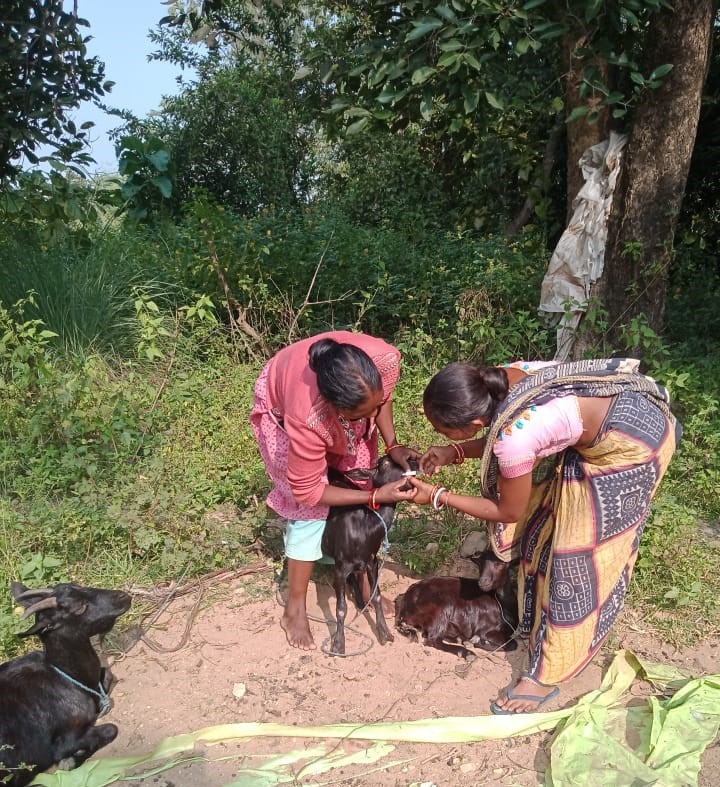 Fig. Goats getting vaccinated
Fig. Goats getting vaccinated
And the world changed around her!
“Ab meri bakriyan swastha hain. Wajan bhi badh gaya hai. Tika lagane se bht faayda hua hai. Aur Kaushlya didi ne jo kuch bhi sikhaya, kaam aa raha hai” (My goats are healthy now, they have gained weight as well. The vaccinations have helped. I am thankful to Kaushlya didi for all she taught me. It's been very useful) says a pleased Savita Seviya.
Savita has also built a shelter for the cattles in her home. She is taking care of them following all the standard procedures. The results are visible!
Her livestock count has increased to thirty-five till date. She also earned Rs. 22,000 by selling 4 male goats till June, 2023 in the span of 6 months. Her income has increased nearly eight-fold, from Rs. 5,000-7,000 in 2021-22 to Rs. 35,000-40,000 in 2023.
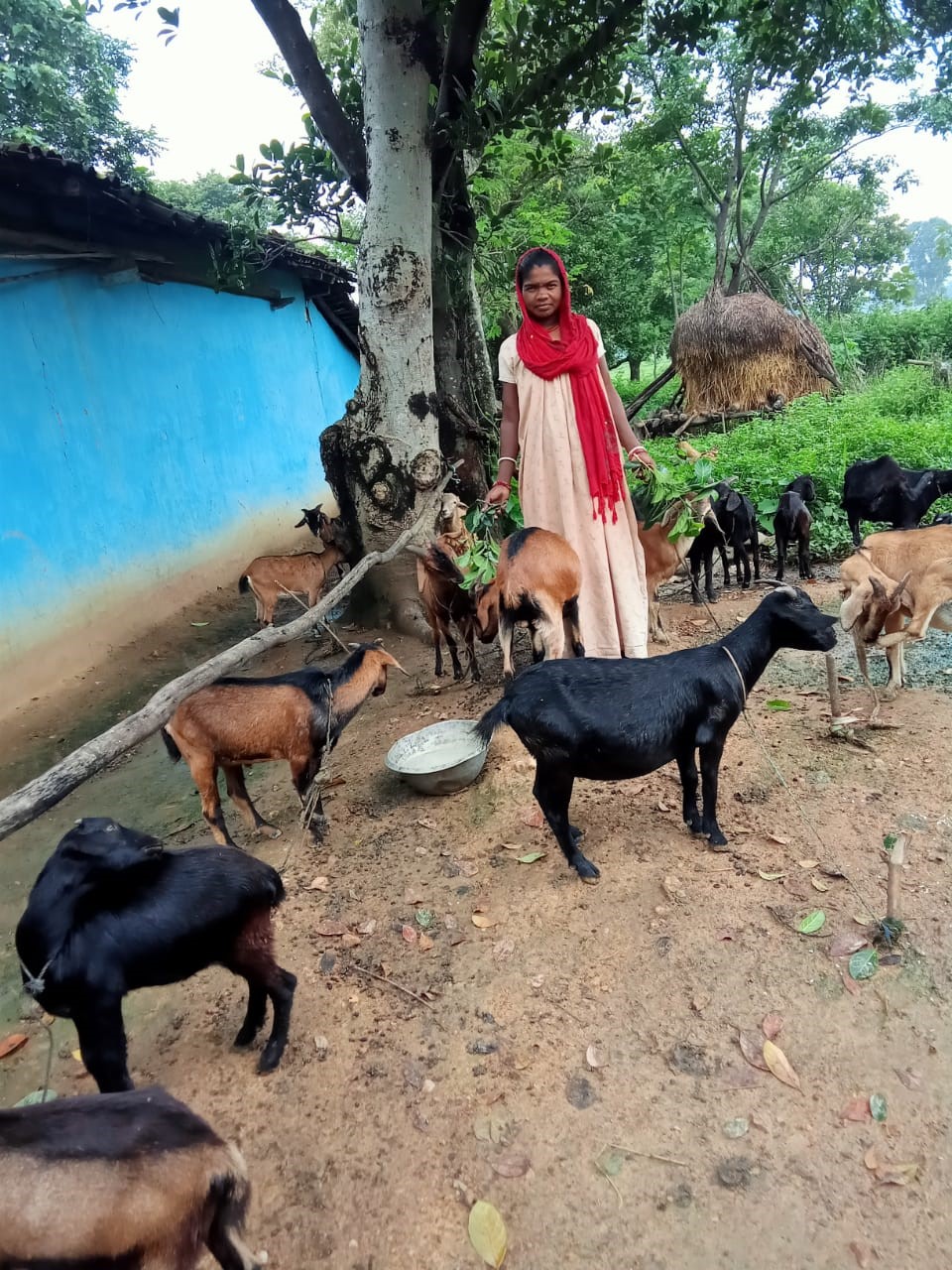 Fig. Savita Seviya with her livestock
Fig. Savita Seviya with her livestock
Savita Seviya is happy. So is her family of ten. She is a major breadwinner now taking care of her family as well as cattles as once.


